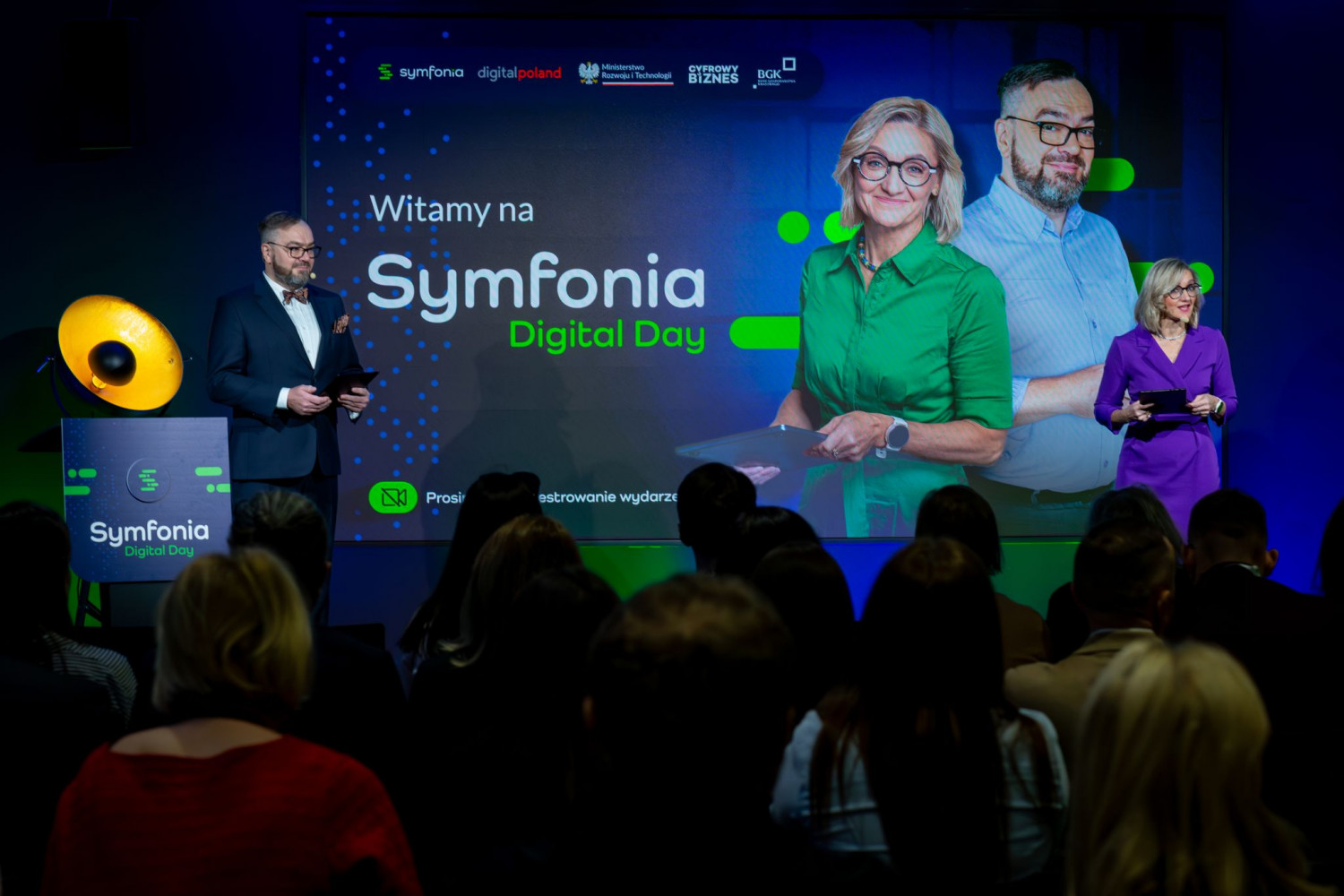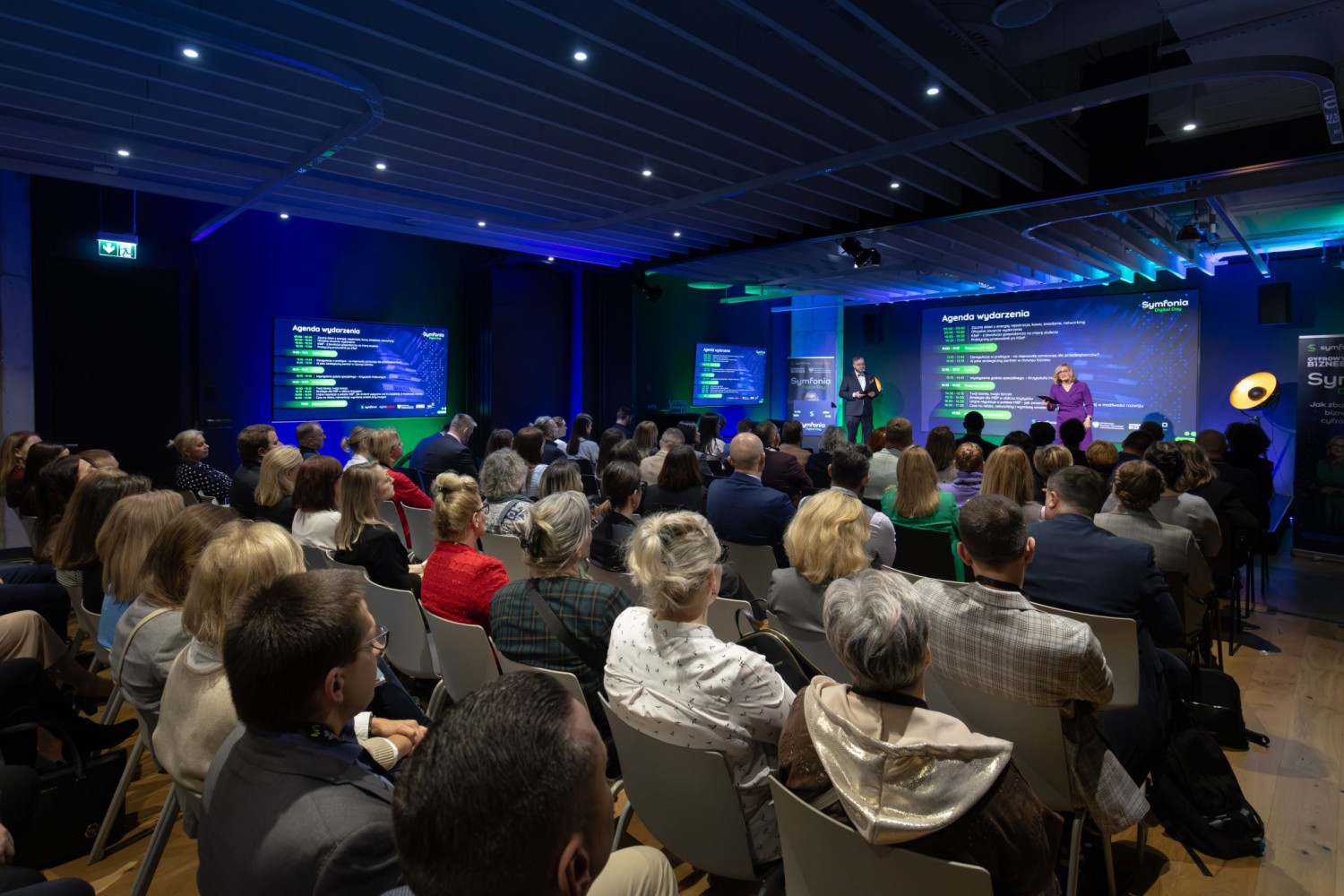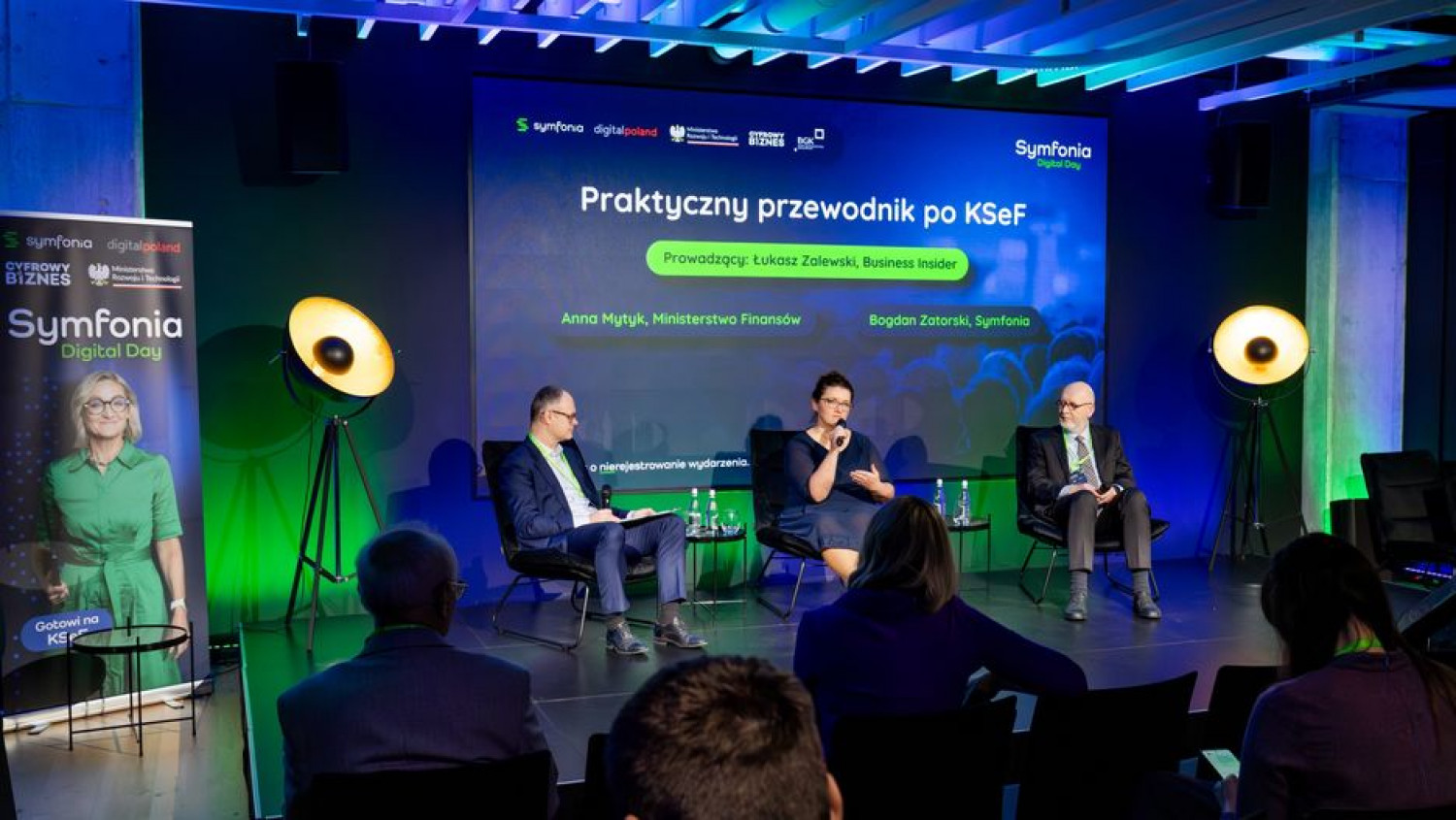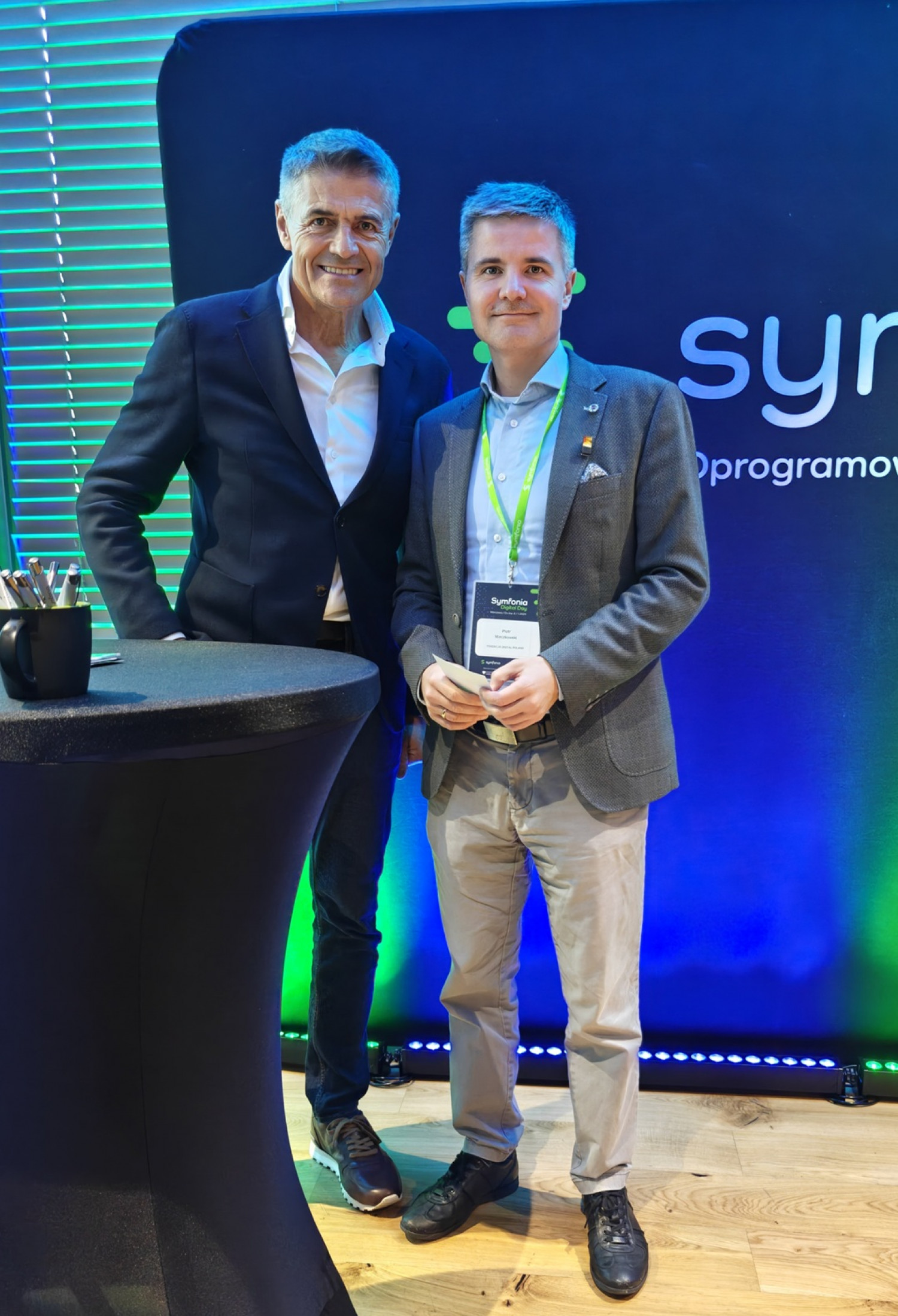Our website is using cookies to deliver best possible experience to you. By using it you agree to cookies policy.
The second edition of the Symfonia Digital Day conference, held under the patronage of the Digital Poland Foundation, brought together hundreds of business leaders, experts and representatives of public administration. The event, organised by Symfonia in cooperation with the Digital Poland Foundation, the Digital Business initiative and Bank Gospodarstwa Krajowego, and under the honorary patronage of the Ministry of Development and Technology, focused on the strategic dimension of digitalisation. The National e-Invoice System (KSeF) was not only a technical challenge here, but also a starting point for a broader discussion on the future of small and medium-sized enterprises (SMEs) in Poland.

From KSeF to AI: Three pillars of digital evolution As emphasised by Edyta Malesza-Malatrat, CMO of Symfonia and co-host of the event:
‘We started with what is here and now – with KSeF. It is a revolution, but also a natural stage in the maturation of the economy. Thanks to it, we were able to open a broader discussion about deregulation and the role of AI as a new strategic partner in business.’
The entire conference was based on three key pillars of successful digital transformation: law, security and strategy. Experts emphasised that only a holistic approach – combining regulatory compliance, data protection and long-term planning – will allow SMEs not only to survive, but to realistically increase their efficiency and scale of operations in conditions of economic and geopolitical uncertainty.

A practical guide to KSeF – how to prepare your company for the invoicing revolution
One of the first panels, moderated by Łukasz Zalewski from Business Insider, provided participants with specific, practical tips on implementing the National e-Invoicing System. Anna Mytyk from the Ministry of Finance and Bogdan Zatorski from Symfonia discussed key deadlines, the most common concerns of entrepreneurs, and proven methods for minimising costs and risks. They emphasised that KSeF is not only an obligation, but above all an opportunity to automate accounting processes, eliminate human error and speed up document circulation. The panellists encouraged early preparation of IT infrastructure and training for teams so that implementation would run smoothly and bring measurable business benefits.
Deregulation in the era of digitalisation – what already works and where is systemic change needed?
The discussion on deregulation, led by Michał Otrębski from Symfonia, brought together experts: Katarzyna Szczudlik from the Schoenherr law firm, Aleksandra Musielak from the Lewiatan Confederation and Natalia Mileszyk from the CEC Group. The panellists agreed that many positive changes have already been introduced in Poland, such as qualified signatures and electronic administrative proceedings. However, there is still no comprehensive systemic vision that would simplify life for entrepreneurs. They also pointed out significant differences in the level of detail of regulations between EU countries – in some countries, regulations are more flexible, which encourages innovation, while in Poland, an overly detailed approach often prevails, generating bureaucracy.

AI as a strategic partner in business development – from theory to a culture of experimentation
In a panel moderated by Wiktoria Kuc from Symfonia, Marta Barcicka from the University of Business in Nowy Sącz emphasised that a true leader in the AI era must combine a business perspective with a technological one, but above all, build a culture of ‘professional learning’ within the company – that is, supporting the team in continuous development, encouraging learning and experimenting with modern tools. Magda Gajownik from PFR, referring to the report ‘Map of AI competences in Poland’ prepared in cooperation with Google, pointed out that the main barrier to AI adoption is not the lack of technology, but the lack of awareness among leaders about the real possibilities of its application. Cezary Jaroni, an AI expert, advised entrepreneurs: do not be afraid to test, create space for experimentation and allow yourselves to fail – this is the only way to discover the true potential of artificial intelligence.
Cybersecurity: Your business, your shield in the digital world
The panel discussion ‘Your business, your shield,’ chaired by Robert Zyskowski from Symfonia, focused on the real threats to SMEs – from phishing and ransomware to deep fakes. Piotr Mieczkowski from the Digital Poland Foundation emphasised that combating cyber threats requires cooperation – both at the national level and in Brussels – to create a friendly environment for the digitalisation of Polish companies. The experts also discussed the culture of security: how to build awareness in a team so that every employee becomes part of the defence? Simple but effective practices were suggested: strong passwords, two-step verification, regular training. Adam Heartle from Zaufana Trzecia Strona assessed that KSeF is cleverly designed and secure – similar to government applications such as mObywatel. Izabela Taborowska from CyberClue noted that SMEs have the weakest security and should treat the implementation of KSeF as the first step towards a comprehensive cybersecurity strategy. The growing interest in the topic, as Mieczkowski noted, is largely due to new regulations such as the NIS2 directive.

Strategy for SMEs in the face of crises – data, facts, inspiration
Dr Małgorzata Starczewska-Krzysztoszek from the Polish Economists' Association cited alarming Eurostat data: only 45% of companies in Poland have used new technologies – AI, big data, cloud computing or IoT – at least once. The main reason? ‘They did not feel the need to.’ Meanwhile, the pace of change is so rapid that failure to adapt means falling out of the market. The panel moderated by Bartłomiej Wasilewski from Radio 357 – with the participation of Aneta Jarczyńska (Symfonia), Ksawery Stojak (BGK) and Marek Andrzejewski (MRiT) – showed that KSeF, although it requires the digitisation of processes, opens the door to rapid growth and development. It is not a cost, but an investment in the future. The final panel, led by Jędrzej Stępniowski from the dotlaw law firm, with Ewelina Stępnik-Godawa (Allegro) and Michał Boni (former Minister of Digital Affairs), focused on the impact of EU regulations on Polish SMEs. Boni criticised the excess of overlapping regulations, which cause chaos, especially in reporting. He proposed replacing hard law with flexible codes of conduct in some areas.

Krzysztof Hołowczyc: Adaptation is in our DNA
Special guest Krzysztof Hołowczyc, rally champion, shared the inspiring story of his career – from sprinter to marathon runner in the Dakar Rally. He emphasised that success is born in conditions of constant change, requiring continuous improvement of technique and strategy. This is an excellent metaphor for entrepreneurs: just as a rally driver must adapt to the terrain, a company must respond flexibly to regulatory, technological and market changes.

Summary: Digitalisation means resilience and an opportunity for growth
The second edition of Symfonia Digital Day proved that KSeF is not a bureaucratic requirement, but a strategic catalyst for the profound digital transformation of Polish SMEs. Smart investments in AI, cybersecurity and regulatory adaptation are not a cost today, but the key to survival, efficiency and stable growth in an unstable market. Representatives of the Ministry of Finance, the Ministry of Development and Technology, economists, lawyers, security experts and AI practitioners took to the stage, all unanimously emphasising that digitisation builds resilience.
Media patronage for the event was provided by Money.pl, Radio 357, MamBiznes.pl, myERP, ERP-view, Magazyn IT and ERP24.
The Digital Poland Foundation would like to thank you for your partnership and invites you to future initiatives for the digital transformation of Poland!